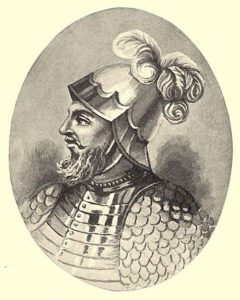
Vasco Balboa
*The birth of Vasco Balboa is affirmed on this date in c. 1475. He was a Spanish explorer, slave trader, governor, and conquistador.
Vasco Núñez de Balboa was born in Jerez de los Caballeros, Spain. He was a descendant of the Lord Mason of the Balboa castle on León and Galicia's borders. His mother was the Lady de Badajoz, and his father was the hidalgo (nobleman), Nuño Arias de Balboa. Vasco's early childhood shows he was the third of four boys in his family. During his adolescence, he served as a page and squire.
In 1500, after the news of Columbus's voyages to the New World became known, he became an explorer. He embarked on his first voyage to the Americas on Rodrigo de Bastidas' expedition. Bastidas had a license to bring back treasure for the King and queen while keeping four-fifths for himself, under a policy known as the Quinto real, or "royal fifth." In 1501, he engaged in the middle passage. He crossed the Caribbean coasts along the Colombian coast from the east of Panama. The expedition continued to explore the northeast of South America until they realized they did not have enough men and sailed to Hispaniola. With his share of the earnings from this campaign, Balboa settled there in 1505. He resided as a planter and pig farmer; he was unsuccessful and abandoned life on the island.
In 1509, wishing to escape his creditors in Santo Domingo, Balboa set sail as a stowaway, hiding on the expedition of Nueva Andalucía. Before the journey arrived, Fernández de Enciso discovered Balboa aboard the ship and kept him aboard. Pizarro started preparations for the return to Hispaniola when Enciso arrived. Balboa gained popularity among the crew because of his charisma and regional knowledge. By contrast, Fernández de Enciso was not well-liked by the men. At that point, the rivalry between Balboa and Pedrarias ceased abruptly due to the intercession of Bishop de Quevedo and Isabel de Bobadilla, who arranged for Balboa's marriage to María de Peñalosa, one of Pedrarias' daughters, who was in Spain.
The friendship between Pedrarias and Balboa lasted barely two years. Balboa wished to continue exploring the South Sea; Pedrarias finally consented to let Balboa go on his new expedition, giving him a license to study for a year and a half. In 1519, Balboa moved to Acla with 300 men and built new ships using the native and African slaves' workforce. He traveled to the Balsas River (Río Balsas), where he had four ships built. Pedrarias wrote warm letters on his return urging Boats to meet him as soon as possible. Balboa quickly obeyed. Halfway to Santa María, he encountered a group of soldiers commanded by Francisco Pizarro, who arrested him in the governor's name. The latter took Pedrarias' power and created a separate government in the South Sea.
Balboa's trial began in January 1519, and Espinosa sentenced him to death by decapitation on the fifteenth of that month. Four of Balboa's friends accused as accomplices received the same fate. The sentence was carried out in Acla to show that the conspiracy had its roots in that colony. As Balboa and others were being led to the block, the town crier announced: "This is the justice that the King and his lieutenant Pedro Arias de Ávila impose upon these men, traitors, and usurpers; of the Crown's territories." Balboa could not restrain his indignation and replied: "Lies, lies! Never have such crimes held a place in my heart; I have always loyally served the King, with no thought in my mind but to increase his dominions."
Pedrarias observed the execution, hidden behind a platform. The executioner beheaded Balboa and his four friends with an ax. The final location of Balboa's remains is unknown, partly because there is no record of what happened in Acla after the execution on January 15, 1519. He is best known for crossing the Isthmus of Panama to the Pacific Ocean in 1513, becoming the first European to lead an expedition to see or reach the Pacific from the New World. Gaspar de Espinosa, Pedrarias' underling, sailed the South Sea aboard the very ships that Balboa had commissioned. In 1520, Ferdinand Magellan renamed the sea the Pacific Ocean because of its calm waters.